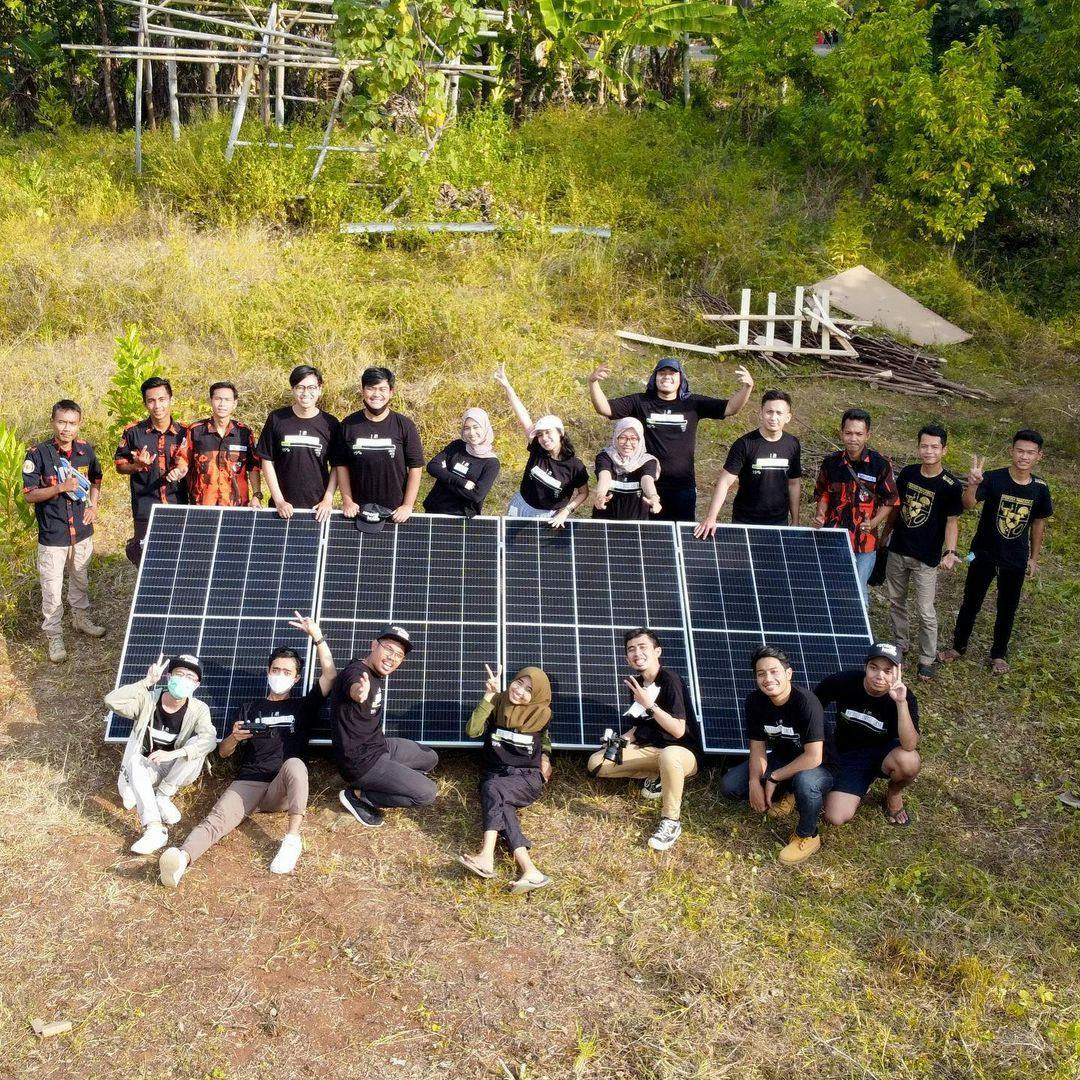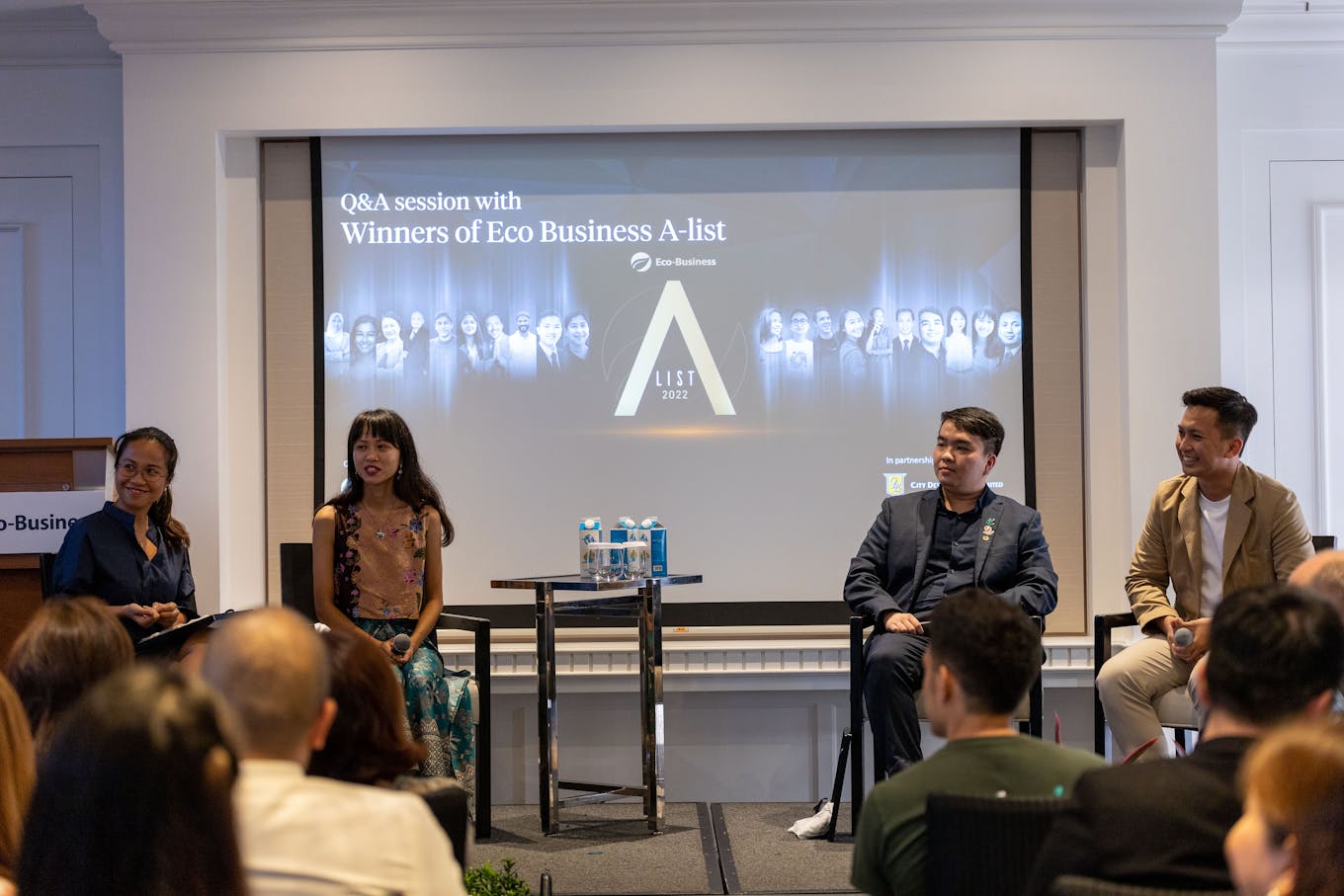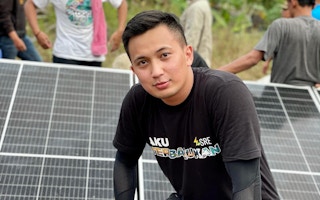Zagy Berian is not happy that American socialite Kylie Jenner, who makes short hops across California on a private jet, has more followers on Instagram than Swedish climate advocate Greta Thunberg, who started the “Fridays for Future” youth strike movement.
To continue reading, subscribe to Eco‑Business.
There's something for everyone. We offer a range of subscription plans.
- Access our stories and receive our Insights Weekly newsletter with the free EB Member plan.
- Unlock unlimited access to our content and archive with EB Circle.
- Publish your content with EB Premium.
Youths need to get involved in energy and climate matters to build a better future for themselves, said Zagy. The 25-year-old, who started the Society of Renewable Energy (SRE) student group advocating for clean energy on campus when he was a mechanical engineering undergraduate in 2019, is set on leading this effort in his home country Indonesia.
Zagy believes that the state needs to work with youths, which make up over half of Indonesia’s population, if the government is serious about its energy transition and climate efforts. SRE, which started out with rural solar panel projects, has become a key strategic partner of the Indonesian government in recent years. Its membership has also skyrocketed, with local chapters in over 40 universities across Indonesia.
Last year, the student group was invovled in G20 events as Indonesia helmed the intergovernmental forum that gathered some of the world’s largest economies; SRE members also completed some 50 rural energy projects.
Running SRE, which has been turned into a non-profit, is now Zagy’s full-time job. He has gotten some venture funding, and is now aiming to start some business initiatives.
“I have to put in more effort to build SRE, partnering with all the stakeholders in the energy sector. I have to give all my time to this,” Zagy told Eco-Business.
Zagy’s efforts in founding and running SRE earned him a spot on the Eco-Business Youth A-List 2022, which recognises young sustainability professionals making an impact in Asia Pacific.
Zagy himself has spoken on several panels and webinars to push for a clean energy transition in Indonesia. He has had audiences with senior policymakers, including Indonesia’s energy and mineral resources minister Arifin Tasrif. Zagy is clear-eyed about the challenges Indonesia, a large developing country still reliant on coal, faces.
“I have to think clearly and wisely,” he said. “We have to think about our society, our nation, and strike a balance.”
Eco-Business sat down with Zagy to find out more about the work that SRE does, and what he thinks are the key challenges in Indonesia’s clean energy transition.
How did you get interested in sustainability and clean energy?
When I studied mechanical engineering in Institut Teknologi Bandung, I learnt a lot about power generation. When we talk about power generation, we then talk about emissions and climate change.
Indonesia needs to create policies to achieve net-zero emissions, and it needs support from the youth. In the past, youths were not familiar with the issue of climate change. That’s why I saw the need to create awareness about renewable energy.
The response from the public has been very good. All of my friends, colleagues and professors supported me in growing SRE. Now we have 3,000 members a year contributing to the cause in Indonesia.
How do you feel about where SRE is now, with 40 university chapters and being involved in G20 activities last year?
SRE is a very strategic partner to the government and the private sector when they want to engage with youths. Most members in SRE are under 28 years old.
When we talk about net-zero emissions and climate change, we have to engage with this group of youths. I don’t want to support other influencers who don’t want to create awareness about climate change. Globally, you see that Greta Thunberg has less followers than Kylie Jenner [15 million against 379 million on Instagram].
I have to push to influence more youths to contribute to climate mitigation and the energy transition in Indonesia. That is what motivates me to do more in SRE.
What is your focus now? Are there plans for further expansion in the years ahead?
We are aiming to expand our network to Southeast Asia and the Indo-Pacific region.
Other than SRE, I am also part of the SDG7 Youth Constituency [A United Nations group focusing on energy issues], and the Global Council on SDG 7 at IRENA [An international renewable energy group]. I was able to speak with youths from other countries at the IRENA youth forum in January and realised that SRE has the potential to expand regionally, or even globally. We are aiming to do that within five years from now.
SRE had about 50 rural solar panel projects across Indonesia last year. What does it take to install solar panels in rural areas, from start to end?
First, we do some social mapping and try to find out which places need the solar panels. After we have this list of locations, we then talk to the government and private sector. I ask them to collaborate with SRE to install the solar photovoltaic panels.
The biggest challenge is Indonesia’s geography. We have more than 70,000 islands and it may be challenging to get the modules, the inverters, the batteries and so on to some of these places.

Society of Renewable Energy implemented about 50 rural renewable energy projects in 2022. Image: Instagram/ Zagy Berian.
We don’t want to just install the solar photovoltaic panels, we also want to train locals to maintain the system. Operating and maintaining the solar panels is not difficult, but we still need to deliver this knowledge to the community. That is where the youths come in, to facilitate knowledge sharing between the experts and the local community.
And it is not just about the technicalities. We also help with the non-technical aspects of the projects, in doing some public speaking, and helping with building networks and marketing.
It is about improving rural livelihoods, and providing them with more economic opportunities, via solar energy infrastructure, to improve their well-being. That is why we create such “end-to-end” solutions, to also help with capacity building in these communities.
How receptive have local communities been to your solar panel projects? Does it take a lot of convincing from your end?
In the beginning there was resistance to our ideas. But as we spoke more with them, over coffee breaks and so on, we started to understand their perspective. They really want to improve their quality of life. So we learnt to talk about the economic impacts of our initiatives early on.
For example, when we install solar photovoltaic panels, the local communities can run more electrical appliances and increase their production level, get higher yields, higher profits.
In some of these areas in Indonesia, the local communities do not get an adequate supply of electricity, and the administrative process is very long to increase the electricity supply coming from the grid. In others, they have diesel generators, but the fuel prices are high. We can help them save on energy costs by replacing part of the diesel electricity with solar power.
How many rural solar projects do you want to complete this year?
Such solutions can be applied to over 200 locations based on government data, but we are still in discussion with our partners on how they can get on board, in terms of funding and corporate social responsibility programmes.
This year, we are targeting perhaps 20 to 30 locations.
What would you say is the biggest challenge in decarbonising the energy sector in Indonesia?
It is about balancing decarbonisation with energy security. We also need to keep energy affordable. Some clean energy sources like geothermal, hydro and biomass are still not economically competitive, though wind and solar power is becoming more affordable.
There is also the issue of intermittency for solar power. We need to focus on energy storage, that is the game-changer, but at the moment it is not price competitive.
We will also need investment and research into new technologies like carbon capture and storage, and ensure that energy workers can continue to have decent jobs amid the transition. Those working in coal power plants and the oil and gas sector today need to get trained up to compete in the renewable energy job market.
There is the Just Energy Transition partnership that will put money into retiring coal power plants in Indonesia. But we also have to think about the current workers, if the coal plants are shut down, how do we help these workers? That is the hardest thing I guess.
Have you spoken to anyone in the coal industry, and how did the conversation go?
Yes, I have had conversations about economic targets, and the affordability of rapid renewable energy buildout. People have told me, Zagy, if you want to create solutions, you have to think wider, in terms of the supply and demand of the energy, as well as the workers.
They guarantee that they can lower emissions through the latest technology, such as supercritical coal plants and using high quality coal. And they do bring up issues of energy security, and the effects of the Russia-Ukraine war too.
What do you bring to the table?
I have to think clearly and wisely. I do push for youth participation in energy and climate, but when we think about our society and nation, we have to strike a balance. The government has a roadmap to shut down coal power plants in the upcoming decades. I agree with such initiatives that have a pipeline.
I also propose new businesses – I talk about opportunities to create renewable energy plants, how to manage their assets, how to invest more into renewables to achieve a just transition.
Do your peers and friends care about climate change and renewable energy as much as you do?
In SRE itself, there are over 30 people like me, who have high ambitions in contributing to our society. In terms of youth participation, we have 3,000 members, and they bring their friends into conversations on climate and energy too.
Even outside the SRE circle, many youths are already engaging with climate and energy issues. There are more communities and initiatives being launched. These are either by youths themselves, or existing organisations that are bringing more youths into their networks.

Zagy Berian (right) speaking on a youth panel at the Eco-Business A-List 2022 award gala. On his left: Tan Shi Zhou, global sustainability consultant at Razer; Neo Xiaoyun, facilitator and programmes executive at The Untamed Paths and educator at Ground-Up Initiative; Ann Adeline Dumaliang, trustee at Masungi Georeserve. Image: Eco-Business/ Firdaus Firlany.
What’s your proudest moment in SRE?
I am proud that I can speak with people at the highest levels in the energy and climate sector. I have the privilege of being able to deliver messages to ministers and senior officials.
Other than that, I am proud of the contributions that youths in SRE have been able to achieve, and the level of ambition within our network. We have been able to work with big organisations to drive participation at events.
What is your long-term career aspiration?
That is a very tough question. I don’t have a specific target in mind, but my biggest dream is to contribute more in the energy or climate sector. I don’t know if that will be in government, in the private sector or in research institutes, but I want to work at a high level, perhaps helping with policies and creating new businesses. I want to contribute more to the society and nation.
How confident are you that we can beat climate change?
A hundred per cent confident. In Indonesia, some 60 per cent of the population are youths. If we want to create a better future, we can work with each other. We have the knowledge, we can leverage our networks and programmes, and encourage more youths to come on board.
Perhaps in 15 years, I can create some impact at the highest levels of energy transition and climate mitigation in Indonesia. When I get there, I will get a chance to craft real, concrete programmes to shape a better world.
This interview has been edited for brevity and clarity.
Zagy Berian was one of 10 sustainability leaders selected for the Eco-Business Youth A-List 2022. Read our stories with other A-List winners here.














